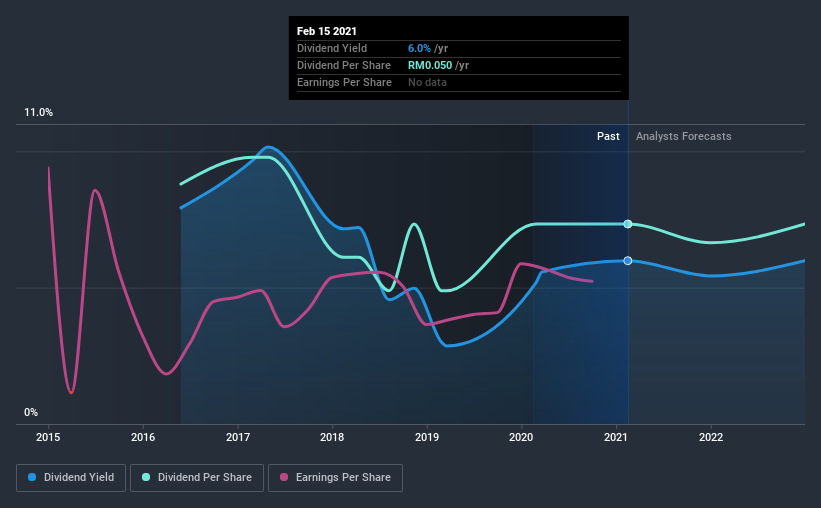- Malaysia
- /
- Water Utilities
- /
- KLSE:RANHILL
Is Ranhill Utilities Berhad (KLSE:RANHILL) An Attractive Dividend Stock?

Could Ranhill Utilities Berhad (KLSE:RANHILL) be an attractive dividend share to own for the long haul? Investors are often drawn to strong companies with the idea of reinvesting the dividends. If you are hoping to live on the income from dividends, it's important to be a lot more stringent with your investments than the average punter.
With a five-year payment history and a 6.0% yield, many investors probably find Ranhill Utilities Berhad intriguing. It sure looks interesting on these metrics - but there's always more to the story. The company also bought back stock equivalent to around 1.2% of market capitalisation this year. When buying stocks for their dividends, you should always run through the checks below, to see if the dividend looks sustainable.
Click the interactive chart for our full dividend analysis

Payout ratios
Dividends are usually paid out of company earnings. If a company is paying more than it earns, then the dividend might become unsustainable - hardly an ideal situation. Comparing dividend payments to a company's net profit after tax is a simple way of reality-checking whether a dividend is sustainable. In the last year, Ranhill Utilities Berhad paid out 15% of its profit as dividends. Given the low payout ratio, it is hard to envision the dividend coming under threat, barring a catastrophe.
We also measure dividends paid against a company's levered free cash flow, to see if enough cash was generated to cover the dividend. Ranhill Utilities Berhad paid out 80% of its cash flow last year. This may be sustainable but it does not leave much of a buffer for unexpected circumstances. It's encouraging to see that the dividend is covered by both profit and cash flow. This generally suggests the dividend is sustainable, as long as earnings don't drop precipitously.
Consider getting our latest analysis on Ranhill Utilities Berhad's financial position here.
Dividend Volatility
From the perspective of an income investor who wants to earn dividends for many years, there is not much point buying a stock if its dividend is regularly cut or is not reliable. Looking at the data, we can see that Ranhill Utilities Berhad has been paying a dividend for the past five years. During the past five-year period, the first annual payment was RM0.06 in 2016, compared to RM0.05 last year. The dividend has shrunk at around 3.6% a year during that period. Ranhill Utilities Berhad's dividend has been cut sharply at least once, so it hasn't fallen by 3.6% every year, but this is a decent approximation of the long term change.
A shrinking dividend over a five-year period is not ideal, and we'd be concerned about investing in a dividend stock that lacks a solid record of growing dividends per share.
Dividend Growth Potential
With a relatively unstable dividend, it's even more important to see if earnings per share (EPS) are growing. Why take the risk of a dividend getting cut, unless there's a good chance of bigger dividends in future? While there may be fluctuations in the past , Ranhill Utilities Berhad's earnings per share have basically not grown from where they were five years ago. Flat earnings per share are acceptable for a time, but over the long term, the purchasing power of the company's dividends could be eroded by inflation.
Conclusion
When we look at a dividend stock, we need to form a judgement on whether the dividend will grow, if the company is able to maintain it in a wide range of economic circumstances, and if the dividend payout is sustainable. Ranhill Utilities Berhad's dividend payout ratios are within normal bounds, although we note its cash flow is not as strong as the income statement would suggest. Second, earnings per share have been in decline, and its dividend has been cut at least once in the past. While we're not hugely bearish on it, overall we think there are potentially better dividend stocks than Ranhill Utilities Berhad out there.
Companies possessing a stable dividend policy will likely enjoy greater investor interest than those suffering from a more inconsistent approach. Still, investors need to consider a host of other factors, apart from dividend payments, when analysing a company. Just as an example, we've come accross 3 warning signs for Ranhill Utilities Berhad you should be aware of, and 2 of them don't sit too well with us.
Looking for more high-yielding dividend ideas? Try our curated list of dividend stocks with a yield above 3%.
When trading Ranhill Utilities Berhad or any other investment, use the platform considered by many to be the Professional's Gateway to the Worlds Market, Interactive Brokers. You get the lowest-cost* trading on stocks, options, futures, forex, bonds and funds worldwide from a single integrated account. Promoted
New: AI Stock Screener & Alerts
Our new AI Stock Screener scans the market every day to uncover opportunities.
• Dividend Powerhouses (3%+ Yield)
• Undervalued Small Caps with Insider Buying
• High growth Tech and AI Companies
Or build your own from over 50 metrics.
This article by Simply Wall St is general in nature. It does not constitute a recommendation to buy or sell any stock, and does not take account of your objectives, or your financial situation. We aim to bring you long-term focused analysis driven by fundamental data. Note that our analysis may not factor in the latest price-sensitive company announcements or qualitative material. Simply Wall St has no position in any stocks mentioned.
*Interactive Brokers Rated Lowest Cost Broker by StockBrokers.com Annual Online Review 2020
Have feedback on this article? Concerned about the content? Get in touch with us directly. Alternatively, email editorial-team (at) simplywallst.com.
About KLSE:RANHILL
Ranhill Utilities Berhad
An investment holding company, operates in the environment and energy sectors in Malaysia, Thailand, Qatar, Australia, Bangladesh, Brunei, Indonesia, Abu Dhabi, Vietnam, Brazil, and internationally.
Slightly overvalued with questionable track record.
Market Insights
Community Narratives



